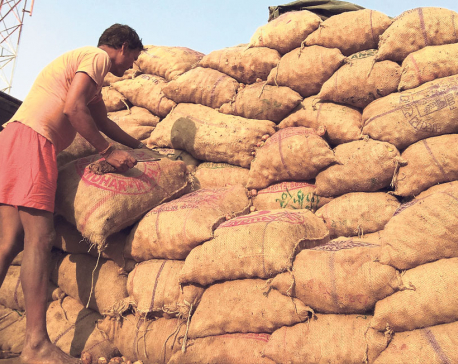
OR
Amendment to Competition Promotion and Market Protection Act, 2007
Govt seeks more teeth to make market inspection effective
Published On: January 31, 2020 09:23 AM NPT By: Republica | @RepublicaNepal
KATHMANDU, Jan 31: The government is making amendment to the Competition Promotion and Market Protection Act, 2007 at a time when authorities have been failing to implement provisions in the existing act, allowing unscrupulous traders a free hand to form cartels and exploiting consumers.
Speaking at a press meet on Thursday, Minister for Communication and Information Technology Gokul Prasad Baskota informed that the cabinet meeting held on January 27 has permitted authorities to table the amendment bill in parliament.
Netra Prasad Subedi, director general of the Department of Commerce, Supplies and Consumers Protection, told Republica that the new provisions incorporated in the bill aim at ending collusion of traders to promote competition in the market.
According to Subedi, the bill envisages forming a dedicated panel to check cartels active in the market. “The panel will be tasked to look into unhealthy practices taking place in selling of both goods and services,” he added.
Though the government has formed Competition Promotion and Market Promotion Board as envisaged by the existing act, its inaction has allowed market cartels to raise their ugly hood time to time. Commercial banks, for example, were indulged in interest rate war some two years ago. Similarly, cartels of bus operators have been harassing new bus operators even after getting permit from the concerned government agency.
In a recent incident, Nepal Chicken Sellers Association increased retail price of chicken. The price of chicken has gone up by Rs 60 per kg to Rs 360 a kg over the past few weeks. Last month, poultry entrepreneurs destroyed six million chicks across the country and hatcheries stopped producing chicks for 10 days to increase price of chicken by bringing down supplies in the market.
Citing possible cartel, the department even cracked down on number of meat shops operating in the Kathmandu Valley on Thursday. According to Subedi, the department slapped cash fine of Rs 5,000 each on Kathmandu Cold Store of Chardobato, and Kalika Meat Shop and Khudra Meat Store of Kalanki on accusing them of charging exorbitant price. “We have asked owners of these shops to appear at the department with necessary details,” added Subedi.
Weak implementation of the law is also apparent in number of goods on which consumers are cheated time and again. The department collected Rs 143,000 in fines from unscrupulous traders selling substandard food items, including meat, over the past week. Rajati Worldwide Mart and Elevation Departmental Store of Tokha were fined Rs 50,000 each – the largest of all.
Similarly, the department also destroyed substandard edibles worth more than Rs 72,000 during the period.
Meanwhile, consumer right activists have termed the government’s move to revise the law ‘futile’ saying that the existing law has sufficient room to check market anomalies. “The existing law has sufficient to check irregularities in the market. The government officials should only be willing to check the unhealthy practices,” Madhav Timalsina, president of the Consumer Rights Investigation Forum, told Republica.
As per the existing act, no individual or collective firms can directly or indirectly determine the purchase or sale price of any goods or services, limit or control production, distribution or markets of any goods or services or limit or control investment, limit or control the overall quantity of the production or distribution of any goods or services or reduce the retail consumption quantity of such goods or quality thereof or restrain the sale and distribution of such goods or services.
Based on the provision of the act, the government formed a separate board that is mandated to assess the lists of enterprises which produce or distribute various goods or services and hold a dominant position. However, the board failing to assume its responsibility has led consumers to sustain abnormal price hike, consume low quality products and face artificial shortage of essentials.
You May Like This

Increase special vigilance to protect consumers
Nepal Bureau of Standards and Metrology (NBSM) has taken action against nearly 8,000 traders in eight months of the current... Read More...

Birgunj traders facing huge loss on potatoes
BIRGUNJ, Dec 5: Potatoes stored at cold stores in Birgunj have failed to find market, causing losses worth millions to farmers... Read More...

NEA disconnects power supply to over 3,000 consumers
KATHMANDU, Aug. 30: Nepal Electricity Authority (NEA) has disconnected power supply to a total of 3,411 consumers across the country,... Read More...







Just In
- NRB to provide collateral-free loans to foreign employment seekers
- NEB to publish Grade 12 results next week
- Body handover begins; Relatives remain dissatisfied with insurance, compensation amount
- NC defers its plan to join Koshi govt
- NRB to review microfinance loan interest rate
- 134 dead in floods and landslides since onset of monsoon this year
- Mahakali Irrigation Project sees only 22 percent physical progress in 18 years
- Singapore now holds world's most powerful passport; Nepal stays at 98th











Leave A Comment